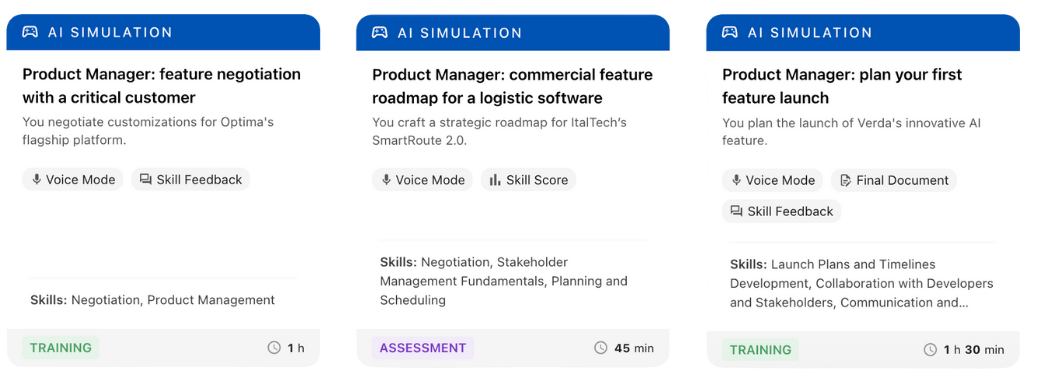From Theory to Practice: How DePaul University Uses AI Simulations to Build Real-World Product Management Skills
From Theory to Practice: How DePaul University Uses AI Simulations to Build Real-World Product Management Skills
DePaul University revolutionized its Digital Product Management curriculum by replacing static case studies with dynamic AI Simulations, offering students immersive, real-world experiences and measurable skill development that translate directly to workforce readiness.
The Organization
DePaul University is a private research university in Chicago, Illinois, and the largest Catholic university in the United States. The College of Computing and Digital Media is known for its innovative approach to technology education and strong industry connections.
With over 22,000 students, DePaul is committed to providing practical, career-focused education that prepares graduates for immediate success in their chosen fields.
The university’s Digital Product Management course needed to bridge the gap between theoretical knowledge and real-world application, preparing students for the complex stakeholder dynamics and decision-making challenges they would face in their careers.
Adjunct Faculty, Jarvis College of Computing and Digital Media at DePaul University

The Challenge: no exposure to workspace dynamics
DePaul’s Digital Product Management course faced three critical challenges that traditional educational methods couldn’t solve:
1) Their previous training methods weren’t preparing students for reality
Static case studies and role-playing exercises provided predetermined outcomes that students could memorize without developing actual skills. There was no way to objectively assess what students could actually do versus what they could recite.
2) Students had no exposure to realistic workplace dynamics
Traditional methods couldn’t replicate the pressure, complexity, and real-time decision-making that product managers face daily. Students graduated with theoretical knowledge but struggled when confronted with skeptical CTOs, demanding stakeholders, or crisis situations.
3) Assessment was completely subjective with no skills measurement
Faculty relied on presentations and group projects that couldn’t measure practical capabilities. There was no objective way to evaluate whether students could negotiate with stakeholders, manage technical constraints, or make strategic decisions under pressure.
Professor Dumiak recognized the fundamental problem:
“Our previous approach used traditional case studies and role-playing exercises, but students weren’t getting the pressure, complexity, and real-time decision-making they’d face as product managers. We could assess their memory of frameworks, but we couldn’t measure their ability to negotiate with a skeptical CTO or on their ability to pivot between strategies when stakeholders disagreed.”
The Solution: AI Simulations by Anthropos
By adopting Anthropos, DePaul transformed their product management education through measurable skills assessment with objective data integrated into academic grading, realistic stakeholder interactions using dynamic AI-powered hands-on simulations, and accelerated student readiness for immediate workforce contribution.
The implementation resulted in enhanced student engagement, improved practical skills development, and seamless integration with existing course structure, leading to expansion plans for additional programs.
Transform Assessment from Subjective to Data-Driven
The first priority for DePaul was replacing ineffective traditional methods with measurable, realistic training.
Previous Methods:
- Static case studies with predetermined outcomes
- Subjective grading based on presentations
- No real-time skills measurement
- Limited exposure to workplace dynamics
With Anthropos, DePaul created dynamic AI stakeholders that challenged student decisions, real-time skills assessment across thousands of competencies, objective performance data integrated into course grading, and unpredictable scenarios requiring authentic problem-solving.
These AI Simulations gave Professor Dumiak objective insights into each student’s actual capabilities in areas like communication styles, critical thinking and creativity in problem solving. He could see exactly how students performed under pressure, how they negotiated with difficult stakeholders, and how they applied theoretical frameworks in unpredictable situations.
“For the first time, I could see which students had natural leadership potential and strategic thinking ability, insights that never emerged through traditional coursework. The skills analytics from Anthropos gave me evidence-based assessment data that completely changed how I evaluate and grade student performance on aspects like their critical thinking and creativity in handling real-time conversations.”
Roman Dumiak | Jarvis College of Computing and Digital Media, DePaul University
Build Real-World Skills Through Immersive Practice
Once assessment capabilities were established, DePaul implemented targeted skill development through realistic scenarios. The course integration strategy included making simulation performance 25% of the final grade, incorporating real-time stakeholder interactions with AI-powered CTOs, marketing leaders, and executives, creating dynamic scenarios covering product strategy, budget constraints, and crisis management, and providing immediate feedback with detailed competency analysis.
Students practiced authentic workplace situations they would face in their careers. At DePaul, Professor Dumiak implemented specific simulations including Product Management: plan your first feature launch, where students navigated the complexities of bringing new features to market, Product Management: feature negotiation with a critical customer, which challenged students to balance customer demands with technical constraints and business priorities, and Product Manager: Commercial Feature Roadmap for a Logistic Software, giving students experience in strategic planning and stakeholder alignment within specialized industry contexts. These simulations are all available in the Anthropos library, accessible to all customers without requiring custom development.
The hands-on experience built practical confidence as students could make mistakes safely, receive instant feedback, and improve their skills in a risk-free environment. This immersive learning prepared them for immediate workforce contribution and significantly improved their readiness for real-world product management challenges.
Results & Impact
By implementing Anthropos, DePaul achieved measurable transformation in student preparation and faculty assessment capabilities.
Students Successfully Assessed
Multiple classes completed AI Simulations throughout the semester with measurable skill development across core product management competencies.
Grade Integration Success:
Simulation performance became 25% of academic assessment using objective skills data, eliminating subjective grading challenges that plagued traditional methods.
Critical Skills Developed:
Students gained practical experience in stakeholder management, strategic thinking, technical decision-making, crisis response, negotiation skills, and product strategy development through realistic workplace scenarios.
Seamless Implementation:
The Anthropos Management Dashboard enabled easy assignment tracking, performance monitoring, and grade integration without disrupting existing course structure.
Enhanced Engagement:
Complete course adoption with unprecedented student participation and practical skill application, significantly improving learning outcomes compared to traditional case study methods.
“The difference was immediately obvious. With our previous case study approach, I was essentially guessing whether students could handle real product management challenges. Now I have objective data showing exactly how each student performs under pressure, how they negotiate with difficult stakeholders, and how they apply frameworks in unpredictable situations.”
Roman Dumiak | Jarvis College of Computing and Digital Media, DePaul University
Looking ahead: new classes will use AI Simulations
Following the success obtained with Anthropos, Professor Dumiak is expanding implementation to additional courses.
Confirmed Expansion for Fall 2025: Professor Dumiak is implementing AI Simulations in the Project Management course, applying the same successful approach to develop practical skills and objective assessment capabilities based on the proven results from the Digital Product Management program.
“AI Simulations solved our biggest challenge: how to give students authentic experience and assess what they can actually do and tailor the learning experience to students needs. This is the future of higher education assessment and training.”
Roman Dumiak | Jarvis College of Computing and Digital Media, DePaul University

